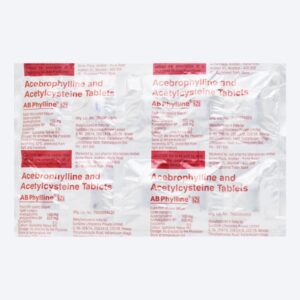
ACIRIGHT 40MG TABLET 10S
KEY BENIFITS,
- GERD Treatment: Pantoprazole is effective in treating symptoms of gastroesophageal reflux disease (GERD), such as heartburn and acid regurgitation.
- Peptic Ulcer Healing: It helps in healing and preventing the recurrence of peptic ulcers in the stomach and duodenum.
- Zollinger-Ellison Syndrome: Pantoprazole can be used to manage conditions like Zollinger-Ellison syndrome, which leads to excessive production of stomach acid.
₹60.00
CompareProduct Introduction:
Aciright 40mg Tablet belongs to a class of medications known as proton pump inhibitors. It works by blocking the action of the proton pump in the stomach lining, which reduces the production of stomach acid.
Aciright 40mg Tablet is a medicine that reduces the amount of acid produced in your stomach. It is used for treating acid-related diseases of the stomach and intestine such as heartburn, acid reflux, peptic ulcer disease, and Zollinger-Ellison syndrome. It provides relief from the symptoms and promotes healing.
Aciright 40mg Tablet is also used to prevent stomach ulcers and acidity that may be seen with the prolonged use of painkillers. It belongs to a class of medicines known as proton pump inhibitors (PPIs). This medicine should be taken one hour before a meal, preferably in the morning. The dose will depend on your underlying condition and how you respond to the medicine. You should keep on taking it as prescribed even if your symptoms disappear quickly. You can increase the efficiency of the treatment by eating smaller meals more often and avoiding caffeinated drinks (like tea and coffee), and spicy or fatty foods.
The most common side effects observed with this medicine include nausea, vomiting, headache, dizziness, flatulence, diarrhea, and stomach pain. These symptoms are generally mild but if they bother you or do not go away, consult your doctor. Long-term use of this medicine may lead to an increased risk of side effects. For instance, using this medicine for more than 1 year may increase your risk for bone fractures, especially with higher doses. Talk to your doctor about ways to prevent bone loss (osteoporosis), like taking calcium and vitamin D supplements.
Before taking this medicine, you need to tell your doctor if you have severe liver problems, are taking medicines for HIV, have ever had an allergic reaction to similar medicines in the past, or suffer from bone loss (osteoporosis). Pregnant or breastfeeding women should also consult their doctor before taking it.
Benefits:
-
- GERD Treatment: Pantoprazole is effective in treating symptoms of gastroesophageal reflux disease (GERD), such as heartburn and acid regurgitation.
- Peptic Ulcer Healing: It helps in healing and preventing the recurrence of peptic ulcers in the stomach and duodenum.
- Zollinger-Ellison Syndrome: Pantoprazole can be used to manage conditions like Zollinger-Ellison syndrome, which leads to excessive production of stomach acid.
Side Effects:
Common side effects may include:
- Headache
- Nausea
- Diarrhea
- Abdominal pain
Serious but rare side effects may include:
- Clostridium difficile infection
- Bone fractures
- Low magnesium levels
- Kidney disease
It’s important to contact a healthcare professional if you experience severe or persistent side effects.
Usage Guidelines:
-
- Pantoprazole is usually taken orally, once a day, with or without food.
- The tablet should be swallowed whole, not crushed or chewed.
- It’s essential to follow the prescribed dosage and duration of treatment as advised by a healthcare professional.
- If a dose is missed, it should be taken as soon as remembered, but if it’s almost time for the next dose, the missed dose should be skipped.
Drug Interactions:
- Pantoprazole may interact with certain medications, including:
- Warfarin (increasing the risk of bleeding)
- Clopidogrel (reducing its effectiveness)
- Ketoconazole and itraconazole (may decrease their absorption)
- Methotrexate (increasing the risk of toxicity)
It’s crucial to inform your healthcare provider about all the medications, supplements, and herbal products you are taking to avoid potential interactions.
- Pantoprazole may interact with certain medications, including:
Always consult with a healthcare professional for personalized advice, and do not self-prescribe or adjust the dosage without proper medical guidance.
SAFETY ADVICE

Alcohol

Pregnancy

Breast feeding

Driving

Kidney

Liver
| Weight | 0.5 kg |
|---|---|
| Dimensions | 10 × 10 × 10 cm |
Related products
-
Medicines
A B PHYLLINE N Tablet Powerful Bronchodilator and Mucolytic – Pack of 10 Tablets
0 out of 5(0)MARKETERSun Pharmaceutical Industries LtdSALT COMPOSITIONAcebrophylline (100mg) + Acetylcysteine (600mg)STORAGEStore below 30°CProduct Features & Benefits:
- Potent Bronchodilator: Acebrophylline, the primary component, acts as a potent bronchodilator, helping relax and open air passages leading to the lungs, which allows better airflow.
- Effective Mucolytic Agent: Acetylcysteine, our second pivotal ingredient, serves as a highly effective mucolytic agent, helping thin and loosen mucus in the airways, clearing congestion, and making breathing easier.
- Reduces Inflammation: These tablets play a crucial role in reducing inflammation in the lungs, giving relief from chronic obstructive pulmonary diseases (COPD) symptoms.
- Improves Lung Function: Regular consumption of A B Phylline N Tablet may significantly help improve lung function, enabling you to lead a more active and productive life.
SKU: n/a


